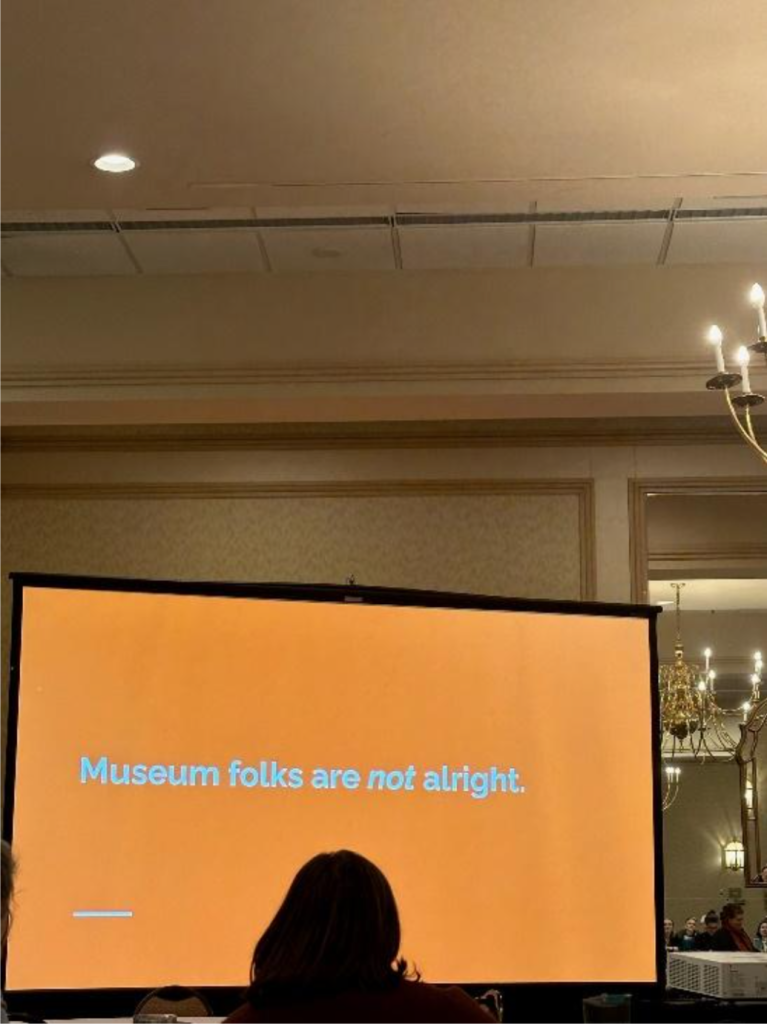Curating Self-Care at NEMA and Beyond

Though NEMA happened back in November, this post written by Tufts Museum Education student Samantha Snow offers useful insights for museum professionals to consider year-round.
Photo courtesy of Nuria Lizarraga
“Museum folks are not alright.”
This message was displayed with a bright orange background on a six-foot tall screen, confronting the room of over 40 museum professionals with an unavoidable truth. The panel, led by Rachel Farkas of the Rose Museum, Alex Lehning of Vermont Cooperative for Practice Improvement & Innovation, and Carole Ann Penney of Penney Leadership, presented some sobering statistics affecting museum professionals today, including the disquieting reality that two thirds of museum professionals are considering leaving the field due to burnout, low pay, and other factors leading to job dissatisfaction. If museums can have a demonstrable positive effect on mental health for the communities that they serve, the panel asked, then why does that benefit not extend to those working in museums?
Museum work is demanding. We are regularly asked to do physical, emotional, and intellectual labor, to be adaptive and collaborative but also decisive, and while we strive to put our communities and institutions first, we often put ourselves last. When we put ourselves last long enough, we find we no longer have the energy to show up for our work, let alone for ourselves. We deserve to have our well-being supported by society and our institutions, but even if they fail us, we still have responsibility for caring for ourselves. We cannot wait for the world to change before taking action on our mental health.
Despite the candid discussions of burnout and poor mental health among museum professionals, the session did not dwell on doom and gloom. This hour and a half meeting was a welcome respite from the hustle and bustle of the NEMA conference. At the start of the session, Alex Lehning guided the audience through a brief breathing and meditation exercise, and I felt my shoulders noticeably relax from the tension of meeting dozens of new people and attending hours of back-to-back lectures over the course of the three-day conference. We listened to the panel members’ reflections on their self-care routines and activities, and everyone had a different approach that worked for them: Rachel makes time for daily exercise and movement, Alex uses meditation, and Carole Ann’s crafts and bakes for herself and others. The panel members explained how self-care activities can be categorized as environmental, social, physical, mental, or combinations of the four and what works for each person is highly individual. This discussion reminded us that self-care is not a one-size-fits-all process – just as we listen to the unique needs of communities in our museum work, we need to listen to our own unique care needs when prioritizing our mental health.
The openness of the panel leaders encouraged openness among the attendees – the folks at my table had fun sharing about our own self-care activities, everything from gardening to journalling to pet cuddles, as part of a break-out discussion. But when the audience began sharing their personal approaches to self-care at the end of the meeting, I was reminded of just how important this conversation is. One museum professional hesitantly spoke up and said that she could not come up with a single self-care activity because any time she spent that wasn’t productive made her feel like she was being lazy. Carole Ann validated her response; we have all been affected by our productivity-obsessed culture and it is particularly pervasive in the museum field. But this mentality, when unchecked, leads to the same dissatisfaction, burnout, and turnover discussed at the start of the session.
We owe it to ourselves to prioritize our self-care so we can keep showing up for ourselves and the communities served by our museum. By curating acts of intentional mindfulness, we can start chipping away at a culture that asks us to put ourselves last. How can you prioritize your well-being today?
Written by Samantha Snow.
